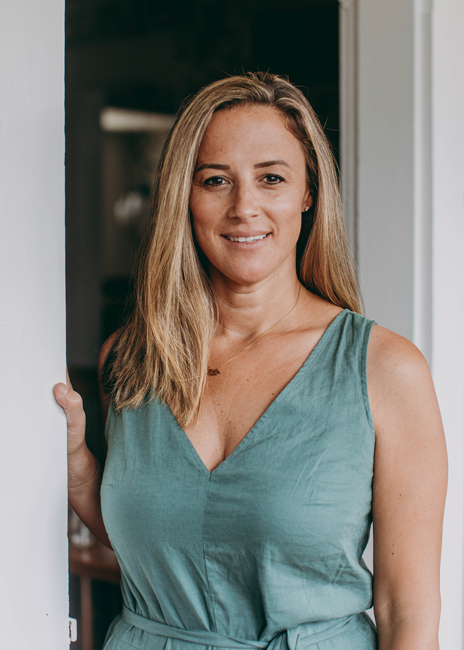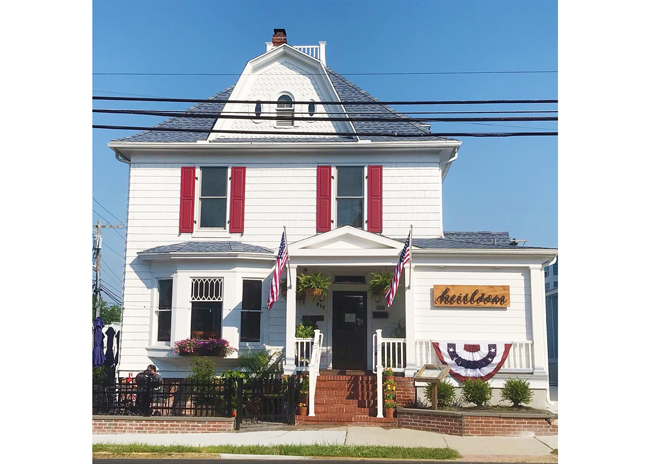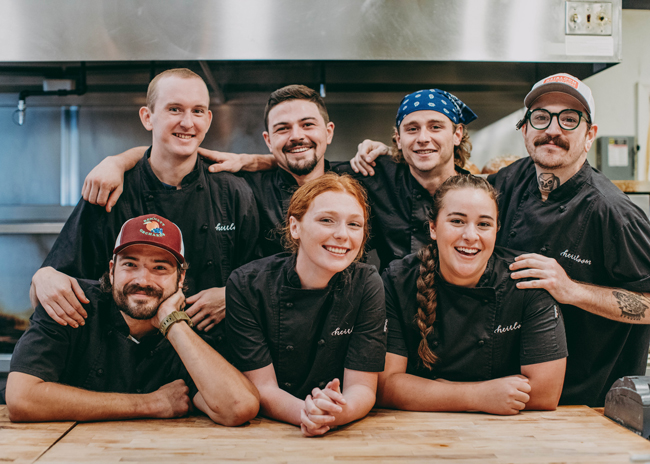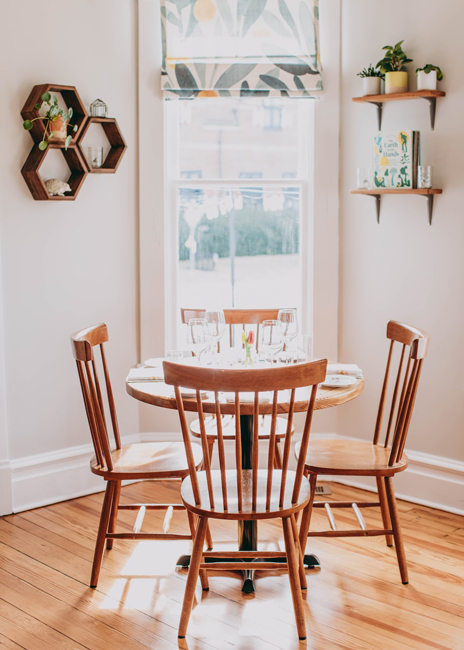The restaurant industry is full of stories that include someone taking a job in their teens not realizing they were about to embark on a lifelong career and professional love affair. Such is the case with Meghan Lee, owner of Heirloom restaurant, a farm-to-table concept, set in Lewes, Del.
 Meghan Lee At 15 years old, Lee started in the restaurant industry as a counter girl and fell in love with the intensity of the business. During the dawn of the farm-to-table movement in the late 1990s, Lee worked as a server at a restaurant in Chester County, Del. The restaurant owners gave Lee an opportunity to be creative, manage people, explore her palate in different cities and be bold and in charge. Seven years later Lee set a goal to open her own restaurant by the time she was 30.
Meghan Lee At 15 years old, Lee started in the restaurant industry as a counter girl and fell in love with the intensity of the business. During the dawn of the farm-to-table movement in the late 1990s, Lee worked as a server at a restaurant in Chester County, Del. The restaurant owners gave Lee an opportunity to be creative, manage people, explore her palate in different cities and be bold and in charge. Seven years later Lee set a goal to open her own restaurant by the time she was 30.
Lee spent the ensuring years absorbing all the details of the restaurant business, the evolving parts to a seasonal menu, the customer service aspect, etc. At 32, Lee was ready to open her own business basing her vision and concept on a collaboration of ideas that came from working at a variety of restaurants in the Mid-Atlantic region. And with that, Heirloom opened its doors in 2015.
Here Lee discusses how the pandemic has affected her business, ways she continues to navigate supply chain challenges and the importance of making the restaurant industry more diverse and inclusive.
How is business these days? Are consumers coming back to the restaurant?
ML: Last year was tremendous for us. It almost doubled what we did in 2020. The Delaware governor lifted the state’s mask mandate just last week, too. Thanks to Valentine’s Day and other holidays there’s been a lot of buzz around restaurants lately. People are not questioning anything; they are just coming into our businesses and trust that we are still doing the right thing for health and safety. Plus, the weather is changing for the better and that will lead to our outdoor patio opening. Once that happens, people will start coming out more.
 Images courtesy of Heirloom
Images courtesy of Heirloom
Any changes that you made during the pandemic that might stick long-term?
ML: Our tables are still spaced at three feet apart. It was originally at six feet. Beyond that, we are doing all of those things you are supposed to do. Our kitchen could not be more sanitary. Our staff is constantly washing their hands. And all of that was standard even before the pandemic. So, we are just looking to continue to be sensitive to people who come in, some of whom continue to wear masks. It’s everyone’s choice and we want to make everyone feel comfortable. Also, when we first opened Heirloom, we were open seven days a week. This past year, though, we went down to five days, so I and my staff now have some semblance of our lives. It really helps with our mental health. At least for the rest of this year, we will stick with that. It was nothing we had ever intended but it’s part of a major industry trend and statistically, we are doing more business in five days than we were in seven. Everyone was working at the same place, and nobody was exhausted by Saturday so there’s an even better vibe across the board.
 The team gathers in the Heirloom kitchen
The team gathers in the Heirloom kitchen
Labor is a sticking point for so many restaurant operators these days, how is it affecting Heirloom?
ML: It just never affected our business. We retained everyone and still have not lost anyone. Part of that is because I take care of my people. Another aspect of that is I am willing to be flexible and work with people if they need an extra day. Most importantly, I’ve chosen the right people that fit into our culture. In July we parted ways with the executive chef, and we are now running a group kitchen. It’s working well. I am just really lucky.
Two other big topics that seem to be affecting the industry are supply chain issues — both food and supply items — as well as inflation. How is your business dealing with these challenges?
ML: For the first time, we increased pricing on our food menu this past February. We have always been diligent about costing out our food to make it affordable for people who want to come here. We’ve definitely seen price increases in dairy and specialty meat items. And we’ve seen changes in delivery schedules. Some vendors used to deliver five days a week or more, now they will only come to our area once or twice a week. So, it impacts how we are ordering. To-go supplies and liquor have been other areas where the supply chain has been an issue. When you increase pricing, you still have to give A-plus service. When that happens, the guests are less likely to question the increases. The warm environment and attention to detail will allow us to provide memorable experiences.
Over the years it has been pretty common for someone to have their first work experience come in the form of restaurants or another foodservice operation. When you first started, did you ever see yourself evolving into an ownership role?
ML: It goes back to my playing sports. I was always a team captain, meaning I was a leader and not a follower. I always had a voice or an opinion. My dad owns his own business, too. So, it was something that came naturally to me. My life is never a flatline. There are twists and turns, ups and downs. I thrive off of that kind of chaos and multitasking. I am good at being a leader and getting people to step up, bringing out the best in them. When we were constructing the restaurant, I would spend days in meetings about things like ventilation or electricity and then spend nights researching it. So, I would go back into meetings with all men and mechanical trades with a bunch of ideas and they would be really surprised at what I knew. When you work like that, your confidence builds from there.
What’s the experience you would like for your team? Your guests?
ML: The biggest compliment is when people say they feel like they are right at home. Our building was built in 1899. You dine in smaller rooms. It’s quaint and comfortable. And when I work the room and talk with people,  The Heirloom dining roomthey often tell us that it feels like they are dining in someone’s home, it’s that warm and inviting. They don’t have to worry about anything. They leave full and happy. That’s been the energy thus far this year. In terms of our team, they know what our expectations are, so we don’t have to repeat them every day. There’s no gray area with me. I try to communicate exactly what I need or want. I try to share what we are doing, why we are doing it and how we came to this decision. They are all on board.
The Heirloom dining roomthey often tell us that it feels like they are dining in someone’s home, it’s that warm and inviting. They don’t have to worry about anything. They leave full and happy. That’s been the energy thus far this year. In terms of our team, they know what our expectations are, so we don’t have to repeat them every day. There’s no gray area with me. I try to communicate exactly what I need or want. I try to share what we are doing, why we are doing it and how we came to this decision. They are all on board.
As a female entrepreneur, what makes you most proud of your business?
ML: Being able to make big and bold decisions on my own. I don’t go with the majority. Being in Delaware, my guess is only 10% of the restaurants are female-owned. Being in that space makes me even prouder and want to work harder. I don’t have to be someone I am not. So, I am not working harder to be one of the guys. I have a lot of male restaurant-owner friends and they encourage me to just be myself. It’s good to hear that because I think my fight is harder and stronger because I am a woman.
Topics like diversity, equity and inclusion are top of mind across all industry sectors these days. Why is the industry becoming more diverse and inclusive important to you?
ML: The pandemic helped call out this issue publicly. People started calling out restaurant owners who were not offering equal pay, for example. For so long people have been overworked and mistreated in this business. I like to think we’re not part of that. But holding people accountable is important. And it was nice for it to come to light and for people to speak about it. Everyone should be paid the same and treated the same based on their experience and skill set. Period. Everyone should get on board or get out. It’s giving businesses like ours, who are trying to build a good culture, a bad name. But it’s been a strange cycle watching this. I try to be the best business leader I can and take care of everyone the best I can.



